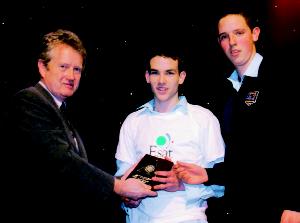| 2002 |

|
YEAR BOOK |
SCOIL MHUIRE, STROKESTOWN, CO. ROSCOMMON
|
Rubbish – household waste disposal and recycling
|

_(1) To find out if local people are using recycling facilities,
_(2) If not, why? and
_(3) Are there plans to establish better facilities in Co. Roscommon?
It had three elements:
_(a) Survey of households to investigate use of recycling facilities,
_(b) Visit to a recycling plant, and
_(c) Comparison of waste disposal in both our homes.
From our survey, we discovered:
_(1) 78% of those surveyed recycle nothing,
_(2) 76% said more facilities should be available, and
_(3) The main reason for not recycling is the long distance to facilities – a major problem in rural areas.
We visited a recycling plant – Dundalk Civic Amenity Centre. This is funded by the Department of the Environment, Local Government and Dundalk Urban District Council. They accept, free of charge: cardboard, newspapers, magazines, glass bottles, jars, scrap metal, mineral bottles, plastic bags, building rubble, white goods, batteries, car engine oil, wood, footwear, clothes, fluorescent tubes, milk cartons, food cans, drink cans, glass and hedge clippings.
We compared how we disposed of our household waste. This gave interesting results as one team member lives in the town with a bin service. That house depends on someone else to dispose of its waste with the exception of a few recycled items – e.g. glass and kitchen waste for composting. Most of their waste goes to landfill. The other member of the team lives in the country with no bin service, and the family is responsible for disposing of all their waste. Through necessity, their household has developed their own recycling system, through burning, composting and recycling, and so the amount of waste going to landfill has been reduced.
We contacted Roscommon Co. Council about their plans for waste management for the future. At present six towns have bring banks with facilities to recycle glass, aluminium cans and clothes. These will be extended and upgraded in rural areas and provided in villages with a population of over 200. Door to door collection of recyclables is planned for three main towns, and six towns will get recycling stations to cater for the collection of recyclable wastes, green garden waste, bulky waste (e.g. fridges), and priority waste (e.g. batteries, waste oils).
After completing our project we concluded:
_(1) The majority of local people do not recycle,
_(2) The majority would recycle if facilities were available, and
_(3) The County Council has plans to establish better recycling facilities.
Tadgh Leonard & Oliver Kiernan entered their project in the Intermediate Group Section in the Social and Behavioural Sciences Category at the Esat Young Scientist and Technology Exhibition in January 2002. They won a Special Award presented by Comhar.
Their teacher was Ms Marie Donnelly.
|
|